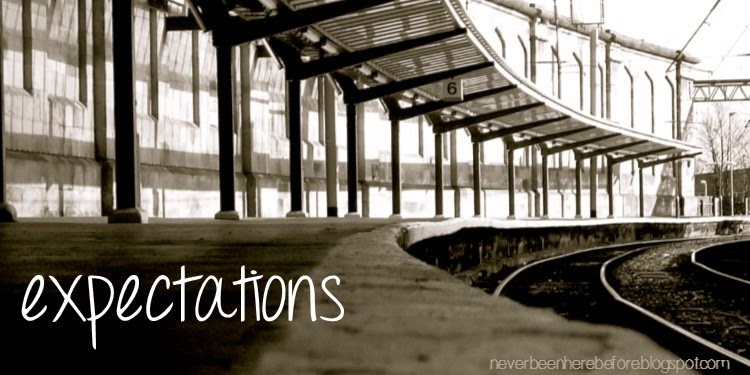Generation, Schmeneration
My small group leader asked us all our ages last week. The range for us is 26-34 years old and she has a niece that is struggling - struggling with finding her place and purpose in the world. She's divorced with two kids and she feels she doesn't belong. So our group leader asked our ages because she wanted to know if it was a generational issue.
Hmm. I'm always intrigued by people who like to blame things on "generations". Sometimes I think that's simply a cop out. Generations are defined by a number of things - the era you were born and grew up in, in particular. But in recent years - Gen-X and Gen-Y for example, tend to be defined by their attitudes (Typically, you don't see much of the Baby Boomer generation being defined by that). George Barna uses this for generation definition:
Elders (born prior to 1946)
Baby Boomers (born from 1946-1964)
Busters (born from 1965 through 1983)
Mosaics (born from 1984 to 2002)
I'd never heard the term "Mosaics" before I read Barna, I've heard them called Gen-Y or Millennials, with a slightly different ago group attached to it. I have a close friend that considers herself a Gen-Y, although she was born in the Gen-X era. Which is where this issue becomes blurred. What defines your generation? When you were born, what you grew up around or what your attitude is?
I'm a Gen-Xer (or Buster, as Barna defines) since I was born in 1975, but I don't have a stereotypical Gen-X attitude. Why? Because I chose not to. So I ask the question: If I feel disconnected from society (like my small group leader's niece does) is that a choice I make or simply an end result of the culture I grew up in?
It's weird. Years ago I felt the constant need to defend my generation. We're the slackers, the disconnected, the under-achievers with Master's Degrees in Shakespeare working at Starbucks. In a small way I connect with that attitude without any knowledge as to why. Kind of like the first time my faith was questioned and I was asked why I believed what I believed. I didn't know. So I found out. Now I don't defend my generation. I just choose to let my actions prove the sterotypes wrong.
We have more power than we know. We define our generation by our behavior, our choices, our attitudes. We also have to power to not become what others expect us to be.So no, it doesn't matter what generation you put yourself in, I guess. But don't let that preconcieved notion shape you who you are. Be who you want to be - no one else is near as much fun.
What I'm listening to: Steven Curtis Chapman's All Things New
What I'm reading: Miroslav Volf's Free of Charge and I'm still stuck on George Barna's Revolution
Hmm. I'm always intrigued by people who like to blame things on "generations". Sometimes I think that's simply a cop out. Generations are defined by a number of things - the era you were born and grew up in, in particular. But in recent years - Gen-X and Gen-Y for example, tend to be defined by their attitudes (Typically, you don't see much of the Baby Boomer generation being defined by that). George Barna uses this for generation definition:
Elders (born prior to 1946)
Baby Boomers (born from 1946-1964)
Busters (born from 1965 through 1983)
Mosaics (born from 1984 to 2002)
I'd never heard the term "Mosaics" before I read Barna, I've heard them called Gen-Y or Millennials, with a slightly different ago group attached to it. I have a close friend that considers herself a Gen-Y, although she was born in the Gen-X era. Which is where this issue becomes blurred. What defines your generation? When you were born, what you grew up around or what your attitude is?
I'm a Gen-Xer (or Buster, as Barna defines) since I was born in 1975, but I don't have a stereotypical Gen-X attitude. Why? Because I chose not to. So I ask the question: If I feel disconnected from society (like my small group leader's niece does) is that a choice I make or simply an end result of the culture I grew up in?
It's weird. Years ago I felt the constant need to defend my generation. We're the slackers, the disconnected, the under-achievers with Master's Degrees in Shakespeare working at Starbucks. In a small way I connect with that attitude without any knowledge as to why. Kind of like the first time my faith was questioned and I was asked why I believed what I believed. I didn't know. So I found out. Now I don't defend my generation. I just choose to let my actions prove the sterotypes wrong.
We have more power than we know. We define our generation by our behavior, our choices, our attitudes. We also have to power to not become what others expect us to be.So no, it doesn't matter what generation you put yourself in, I guess. But don't let that preconcieved notion shape you who you are. Be who you want to be - no one else is near as much fun.
What I'm listening to: Steven Curtis Chapman's All Things New
What I'm reading: Miroslav Volf's Free of Charge and I'm still stuck on George Barna's Revolution


Comments